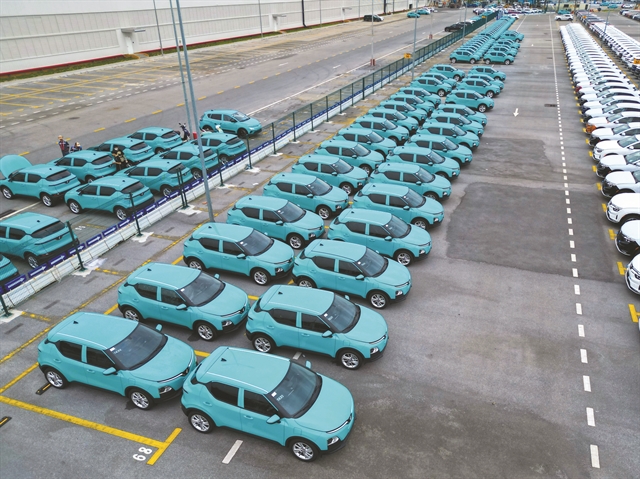 Economy
Economy

 |
| Vingroup's VinFast is one of the pioneers in manufacturing EVs in Việt Nam. Việt Nam needs to have better policies for the development of EVs. — Photo VinFast |
HÀ NỘI — Facilitating the transition to electrified vehicles in Việt Nam, State management bodies must put forth preferential policies, development strategies and initiatives to encourage adoption by users, according to experts.
They said such measures were crucial for promoting the widespread use of electric vehicles (EVs) and achieving the associated environmental and sustainability benefits. Their comments were made during a recent national policy dialogue on accelerating the transition to electric vehicles in Hà Nội.
At the dialogue, Deputy Minister of Transport Lê Anh Tuấn assessed that the transition to green economic development was a vital trend. By embracing green growth, Việt Nam could position itself as a pioneer in the region and align with the global shift toward sustainable development.
There had been efforts to introduce preferential policies to support the production, assembly, and use of electric cars in Việt Nam, but Deputy Minister Lê Anh Tuấn acknowledged that there were still challenges and difficulties to overcome in the transition to green energy.
Some of the key challenges include lack of charging station infrastructure, high vehicle costs, lack of mechanisms to encourage consumption and use, and incomplete awareness of green energy conversion. The awareness and understanding of green energy conversion, including the benefits of electric vehicles and their role in reducing emissions, might still be limited among government agencies and businesses.
According to Phạm Hoài Chung, the Deputy Director in charge of the Institute of Transport Strategy and Development in Việt Nam, the country currently has 5 million cars with an average annual growth rate of 13.3 per cent. Additionally, there are 72 million registered motorbikes with a growth rate of 9.3 per cent per year. It's worth noting that the number of electric cars and motorbikes has been increasing rapidly in recent years,
As of now, there are approximately 20,065 electric cars and around two million electric motorbikes that have been locally manufactured, assembled and imported, and have undergone inspection and certification processes in the country. This indicates a significant growth in the adoption of electric vehicles in the country.
Regarding electric public transportation, Chung said that there were currently electric buses and electric taxis, and there would be great room for the development of electric vehicles, especially when having a green energy conversion roadmap for the vehicle fleet and for buses in urban areas from 2025.
Chung noted that Việt Nam was implementing policies to encourage the use of EVs, particularly battery electric vehicles. Tax incentives could be an effective way to promote the adoption of EVs by making them more affordable for both manufacturers and consumers.
Chung also proposed four groups of policies to support the development of EVs that include incentives to encourage production, assembly and import; encourage and support users; develop electric charging station infrastructure; and encourage the development of public passenger transportation using electricity.
Trần Thị Bích Ngọc, the Department of Administration Supervision on Tax, Fees and Charges under the Ministry of Finance, said that apart from income tax incentives on batteries, import taxes on components for battery production would also be adjusted. Domestically produced goods that do not meet demand would also be kept at moderate tax rates.
Besides, Professor Lê Anh Tuấn of Hanoi University of Science and Technology told participants that solutions to help Vietnamese users switch to electric vehicles relied on tax preferential policies for manufacturers, and tax reduction for buyers.
Tuấn pointed out an example that preferential policies aim to promote the adoption of electric vehicles (EVs) by offering certain advantages over traditional cars, noting that the special consumption tax (SCT) on electric vehicles is currently set at a lower rate of three per cent until 2027. Traditional cars, which generally run on fossil fuels, are subject to SCT rates ranging from 15 per cent to 150 per cent.
For electric cars, the registration fees are waived, meaning that buyers do not have to pay this fee. On the other hand, traditional cars still incur registration fees, which typically amount to around 10 per cent of the car's value. This further reduces the upfront cost of owning an electric vehicle, according to Tuấn.
Đào Công Quyết, an expert of Vietnam Automobile Manufacturers Association (VAMA), highlighted the importance of collaboration between the State and businesses in the transition towards electrified vehicles and vehicles using green energy in Việt Nam. According to his statement, both the State and businesses need to contribute their resources to make this transition successful.
Regarding policies to support electric vehicle users, Quyết suggested that implementing policies to encourage electric vehicle (EV) adoption is an effective approach. By creating incentives and solutions that make EVs more attractive to consumers, such as subsidies, tax credits, or improved charging infrastructure, the hope is that consumers will choose EVs over traditional cars when there is price competition.
Nguyễn Văn Hội, Director of the Institute for Industry and Trade Strategy and Policy Research, highlighted the importance of increasing the localisation rate in the battery manufacturing industry as part of the electric vehicle development strategy. Localisation refers to the process of increasing domestic production and reducing reliance on imported components or materials. By boosting the localisation rate, a country can enhance its self-sufficiency in producing key components for electric vehicles, such as batteries.
Phan Lê Hoàng Linh, Head of Manufacturing Department under the Ministry of Industry and Trade, emphasised developing EVs and environmentally friendly vehicles as one of the most important contents when building a strategy for developing the automobile industry. — VNS




